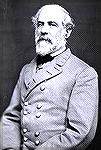
01/17/2007
Robert E. Lee born 200 years ago
By Bob Lassahn
 General Robert E. Lee, CSA
General Robert E. Lee, CSA
The notation shows up on few calendars, but in many Southern States, including neighboring Virginia, January 19 is marked as a holiday. It marks the birthday of a man recognized by many people around the globe as a great American. January 19, 2007 marks the 200th birthday of Robert Edward Lee, best known as the leader of Confederate armies in the Civil War.
The State of Virginia commemorates Lee's birthday as part of Lee-Jackson Day (separated from the Martin Luther King, Jr. holiday there in 2001 and celebrated on the Friday preceding the King holiday); the state of Texas observes Confederate Heroes Day on January 19, Lee's actual birthday; the states of Alabama, Arkansas and Mississippi observe Lee's birthday on the third Monday in January, along with Martin Luther King, Jr.; and the State of Florida, as a legal public holiday, on January 19.
While associated primarily with command of the Confederate Army, Lee's career as an officer serving honorably in the United States Army prior to the Civil War spanned some 30 years.
Robert Edward Lee was born at Stratford in Westmoreland County, VA, the fifth child of Henry "Light-Horse Harry" Lee, a cavalry commander during the Revolutionary War and a onetime governor of Virginia, and his second wife, Ann Hill (Carter) Lee. Other relatives had signed the Declaration of Independence, served in George Washington's Cabinet and served in Congress.
Educated in the Alexandria, VA schools, Lee obtained appointment to West Point in 1825, and graduated second in a class of 45 without a single demerit against his name, something not matched until much later by Douglas MacArthur. Lee was commissioned a Second Lieutenant of Engineers.
On June 30, 1831, he married Mary Ann Randolph Custis, the daughter of George Washington Parke Custis, grandson of Martha Dandridge Custis Washington and adopted grandson of George Washington. They were married at her parents' Arlington estate, which she later inherited making it the Lees' home. They had seven children, three sons and four daughters.
For 30 years he served his country at various posts around the U. S. including exemplary service during the Mexican War in 1846 and 1847. Under the command of General Winfield Scott, Lee participated in the campaign from Vera Cruz to Mexico City. He fought meritoriously in the battles at Vera Cruz, Cerro Gordo, Contreras, Churubusco and Chapultepec. Following a stint in Baltimore Harbor, Lee served as Superintendent of the academy at West Point from 1852 to1855.
The highest rank that Lee attained in the U.S. Army was Colonel of the 1st Cavalry, serving on the Texas frontier in the campaigns against hostile Indians. Upon the death of his father-in-law in 1857 Lee requested leave to settle the estate and returned to east.
Later recalled to duty in 1859, it was Colonel Lee who led a Marine detachment to secure the fire engine house at Harper's Ferry on October 17, arresting abolitionist John Brown after he raided the U.S. Armory located there. Lee then returned to Texas until 1861 when summoned to Washington by Winfield Scott who tried to retain Lee in the U. S. service with an offer to command the Union's field forces.
Lee refused the offer and resigned his commission on April 20, 1861, the day after Virginia seceded from the Union. On April 23, he accepted an offer from Virginia Governor, John Letter, to take Command of Virginia's military forces with the rank of Major General.
In 1862 Lee was named commander of the Confederate Army of Northern Virginia, and over the next three years led the army to a series of victories against larger and better-equipped Union forces. He was defeated at the 1863 Battle of Gettysburg and finally surrendered to General Ulysses S. Grant at Appomattox Courthouse on April 9, 1865, effectively ending the Civil War. During these years Lee's leadership achieved legendary status, making him an icon of both the Confederacy and America.
Lee's estate at Arlington had been seized by the government (he was later paid $150,000), so he returned to Richmond as a paroled prisoner of war and assumed the presidency of Washington College (now Washington and Lee University) in Lexington, VA. His reputation revitalized the school after the war and he implemented a strict honor code that still exists today. He also instituted a Reserve Officer Training Corps (ROTC), the first at a non-military institution.
Lee's wartime prestige, both in the North and South, made him a legendary figure even before his death. He died on October 12, 1870 of heart disease and is buried at the college. His faithful steed Traveler, who served with him throughout the Civil War, marched behind his casket during the funeral. When Traveler died he was interred just outside of the building where Lee lay in eternal repose.
Lee's application for restoration of citizenship was mislaid, and it was not until the 1970s that it was found and granted. The ceremony took place at his beloved Arlington, with President Gerald Ford signing the order.
Send an Email Letter to Courier Editor - be sure to include your telephone number.
Uploaded: 1/17/2007



